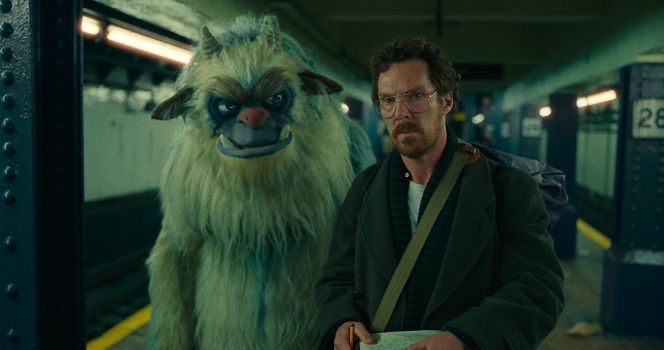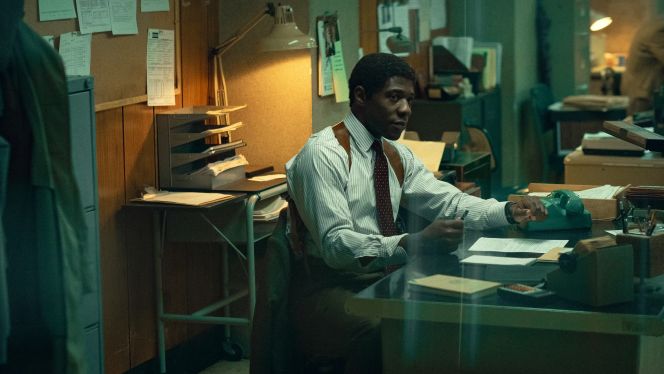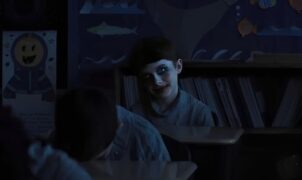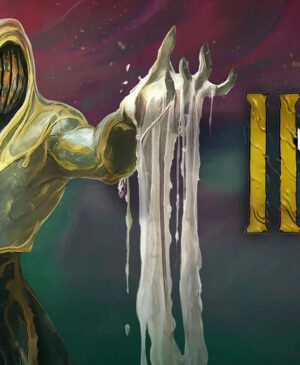SERIES REVIEW – Last month, Netflix released a miniseries called Baby Reindeer, a semi-autobiographical dark comedy by Richard Gadd that delved into deep and dark topics. The new series Eric, starring Benedict Cumberbatch, shares many similarities with Baby Reindeer, in its boldness and the tackling of relevant but heavy themes, almost stacking them on top of each other.
A series about a missing child is nothing new; after all, that’s how Stranger Things started. But when you add issues of racism, police corruption, homelessness, the AIDS epidemic, and addiction, and throw in a giant talking puppet, you get Eric. Abi Morgan’s series handles a lot, and its unique selling point of a star like Cumberbatch teaming up with a giant monster puppet is sure to grab attention.
This drama, compelling in many ways, follows Vincent, a father tormented by the disappearance of his young son, Edgar, in 1980s New York. As Vincent delves into the chaotic urban landscape to find his son, he increasingly depends on Eric, a puppet he created, to cope with his despair. Eric evolves from a mere puppet into a significant presence in Vincent’s life, helping him navigate his emotions and the challenges he faces.
What Is ‘Eric’ About?
Set in 1980s New York, the story introduces us to Vincent (Cumberbatch), a narcissistic, troubled, yet wildly talented puppeteer who co-created the popular children’s show Good Day Sunshine. Vincent’s marriage to Cassie (Gaby Hoffmann) is quickly falling apart, and their precocious nine-year-old son, Edgar (Ivan Morris Howe), constantly seeks refuge from his parents’ fighting.
One morning, tired of waiting for his arguing parents, Edgar decides to walk to school by himself. Vincent’s lifelong struggles with mental illness reach a peak upon learning that Edgar has gone missing. While Detective Michael Ledroit (McKinley Belcher III) searches for the missing child, Vincent believes that the only way to find his son is to bring to life his drawings of a blue and white monster named Eric on Good Day Sunshine. As the days pass, Vincent’s severe alcoholism starts to cost him both personally and professionally. He also begins to hallucinate Eric, and his conversations with the foul-mouthed monster baffle everyone around him.
Michael begins to theorize whether Edgar’s disappearance is related to that of a young Black teenager who disappeared eleven months earlier. The teenager’s mother (Adepero Oduye) has been waging a one-woman war on the NYPD for failing to find her son. The series also delves into Michael’s personal life, his closeted sexuality, and his relationship with his boyfriend (Mark Gillis), who is dying of AIDS.
Too Many Ideas, Too Little Execution
Eric’s pilot, simply put, is excellent. The series opens with footage of Vincent on the news, pleading for Edgar to “just come home.” The series then flashes back 48 hours earlier, where we find Edgar happily visiting his father on the set of Good Day Sunshine. However, in the first 15 minutes of the pilot, Vincent’s cracks begin to show as the network demands changes to the show, and he constantly berates his wife, Cassie. The only time we see Vincent in a better light is when he tries to bond with his son by quietly mocking other subway passengers. The rest of the pilot plays out as Vincent’s sanity spirals further downward.
After this introduction, the remaining five episodes of Eric introduce more and more conflicts. The series becomes convoluted as Vincent and Cassie’s search for their son gets lost amidst a flood of ideas. Eric tries to tackle several real-world issues head-on, and while it is an admirable effort, the series’ slow burn makes the viewing experience less pleasant. The series eventually tries to connect all these overarching storylines, but it comes to a point where Eric’s efforts to cover topics of racism and sexuality feel half-baked.
The mystery behind Edgar’s disappearance is always compelling, especially how it ties into Vincent’s inner psychology. We learn more about Vincent’s upbringing, his estranged relationship with his wealthy parents, and his battles with mental illness. At a certain point in the series, Vincent has less screen time, and his scenes mainly consist of him talking to the hallucinated Eric puppet. The constant feeling of dread and misery never fully dissipates, but that doesn’t stop the show’s tone from often feeling misguided. It’s hard for viewers to decide whether to laugh at Vincent’s bickering with Eric or be concerned. Eric never fully commits to its concept enough for viewers to know either way.
Cumberbatch’s performance as the increasingly disheveled Vincent is always fascinating. From The Power of the Dog to Sherlock to Doctor Strange, he is not your typical A-list actor, as he rarely repeats himself on screen, and each character feels unique. Cumberbatch fully commits to the role, and despite Vincent’s narcissistic tendencies, he manages to invoke sympathy for the character. Although Vincent constantly pushes everyone away, Cumberbatch’s portrayal imbues him with humanity and understanding, making the character work. It’s hard to simply hate him.
Belcher, as Detective Michael Ledroit, is another standout in the series. The character is much more than a typical detective role, and while Michael’s sexuality and personal life could have easily fallen prey to tired tropes and outdated perspectives, this is not the case here. Belcher’s restrained performance perfectly contrasts Cumberbatch’s livelier portrayal, serving as the true eyes and ears of the audience. Hoffmann, as Cassie, is also excellent, bringing depth and rawness to a character that could have easily been one-dimensional.
Paranoia and Complexity
The series is accompanied by a constant paranoia, making it hard to determine whom to trust. However, when Eric’s plot concludes, it ties up the loose ends too neatly. Throughout the series, it attempts to weave parallel storylines about racism and police corruption, but in the end, it tries to wrap everything up with a simplistic conclusion. The execution feels too easy, especially compared to the dire tone of the first five hours. While many unique elements can be admired, the series as a whole feels a bit disjointed, cramming too many ideas into six hour-long episodes and ending with an overly tidy and simple resolution.
-Gergely Herpai (BadSector)-
Eric
Direction - 4.6
Actors - 8.2
Story - 6.4
Visuals/Music/Sounds - 6.2
Ambience - 6.6
6.4
FAIR
The series Eric uniquely combines mystery elements with the world of puppetry, centered around Benedict Cumberbatch’s captivating performance. Although the story sometimes tries to tackle too many themes at once, the unique characters and dark tone provide a high-quality experience. The series may not be perfect, but it is certainly a noteworthy attempt, offering an exciting and deeply thought-provoking journey for viewers.


















Leave a Reply